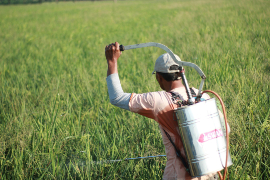聚光灯
农药销售代表作物保护产品经销商农资销售顾问农业投入品专家
每逢种植季节,农民们都面临艰难抉择——该种什么作物、何时播种、如何保护农田免受虫害、杂草和病害侵扰。此时他们便寻求专业人士的帮助,这些专家深谙如何通过产品保障作物健康生长、提高产量。
此人被称为农药经销商。他们深谙化肥如何提升土壤养分、除草剂如何阻止杂草蔓延,以及哪些农药最安全有效。他们不仅销售这些工具,更会指导如何负责任地使用,并遵守重要的安全与环保规定。
农药经销商与农民紧密合作,实地走访农田,精准提问,并根据每家农场的具体需求量身定制解决方案。他们时而奔波于田间地头,时而埋头研究产品、研读标签,或在商店仓库中核对库存。
这是一份融合科学、农业与传播的职业。对于喜欢帮助他人取得成功的人来说再合适不过了——从字面意义上,就是从零开始!
- 在帮助农民养活社区方面发挥直接作用
- 看到农作物因您的建议和产品而茁壮成长
- 在户外工作,身处紧密团结的农业社区
- 赢得信任,建立长期的客户关系
工作日程
农药经销商通常全职工作,工作时间多遵循常规营业时间。但在繁忙的播种和生长季节,他们可能需要提早到岗、延迟下班,甚至周末加班以满足农民需求。由于经销商常需驾车前往辖区内的农场及农业企业,出差是常见的工作状态。
典型职责
- 安排农场访问及与种植户、合作社经理和农业企业主会面,以了解其作物保护和土壤改良需求。
- 评估田间土壤状况、病虫害问题及作物生长阶段,以提供产品建议。
- 对农民进行农药安全操作、使用剂量及储存方法的教育培训
- 准备并提供报价单、产品规格书和使用说明书
- 管理肥料、除草剂、杀虫剂及其他产品的库存水平
- 处理订单,安排配送或自提时间,并确保及时完成。
- 追踪产品性能,收集用户反馈,并解决现场问题
- 及时了解联邦和州政府关于化学品销售和使用的法规
- 记录所有销售情况并保持准确的记录以符合监管要求
额外职责
- 参加农业博览会、行业会议和培训课程,以保持知识更新。
- 为农民和社区团体提供产品演示或工作坊
- 通过在整个季节定期与客户保持联系,维持持续的合作关系。
- 与农艺师、种子经销商及其他专家合作,提供综合解决方案
- 根据市场趋势,协助完善公司销售策略或提出新产品线建议。
清晨常在日出前便已开始——查看天气预报、追踪农产品行情、核对配送计划。随后便要踏上征程,走访本地农场,踏遍田间地头,翻动土壤,排查病虫害与养分问题。与种植户的每段对话都充满实操细节:"是否需要调整施用剂量?"或"那款杀菌剂效果还维持得好吗?"
午后时光用于处理待办事项:发送报价单、安排货运、在卡车或办公室里更新田间记录。有时会与供应商快速通话了解新产品。在播种和收获季节,接到农民在黎明前寻求支持的深夜来电也屡见不鲜。
“我对农业的热忱源于助力种植者实现经营成功、繁荣发展并保持可持续性,这样我们才能在未来继续从事这项事业。 ”——贝利,纽特利恩零售作物顾问
软技能
- 沟通技巧
- 客户服务
- 分析性思维
- 问题解决
- 注重细节
- 有组织的
- 诚信
- 独立
- 患者
- 关系建设
- 决定性的
技术技能
- 作物生产与土壤科学的知识
- 对肥料、农药和除草剂的理解(包括安全操作规范及相关法规)
- 熟悉农业市场及季节性趋势
- 解读土壤测试和现场报告的能力
- 库存管理软件
- 客户关系管理(CRM)系统
- 基础销售预测与数据追踪工具
- 基于GPS或精准农业工具
- 农药销售的州级与联邦合规知识
- 独立经销商:经营自己的业务或小型区域公司。
- 合作经销商:在农民自营合作社内开展工作。
- 企业代表:受雇于大型农业供应公司。
- 农业供应公司和零售商
- 农民合作社
- 区域性农作物服务企业
- 大型农业企业集团
农资经销商在帮助农民保护作物、实现产量最大化方面发挥着关键作用。由于农业生产具有不可预测性,且高度依赖天气、市场价格和虫害挑战,当问题出现时,经销商常需随时待命,提供快速解决方案。
经销商需及时掌握不断变化的法规、新产品及日益严格的环境标准。他们不能依赖过时的知识,也不能认为上个季节行之有效的方法如今依然适用。保持信息更新并提供准确、基于科学的指导至关重要。
当然也存在牺牲。在繁忙季节——比如播种和收获期——往往意味着长时间工作、频繁出差以及远离家园。经销商有时需要进行艰难的沟通,比如解释更便宜的仿制农药可能无法获得售后服务或质量保证。正如一位农民所言:
“这就像你从小吃着水果麦片长大,现在却去一元店买水果脆片。”——解释为何部分种植者坚持选择有售后保障的品牌产品。
在农民需求、监管规则和商业目标之间寻求平衡虽具挑战性,但这是确保农场与社区共同繁荣的关键所在。
农业供应领域正经历快速变革,农民面临着气候变化、市场需求变化以及更严格的环境法规带来的多重压力。气温上升、降雨不规律以及新型病虫害的威胁,都可能影响作物健康,并增加对更精准化学解决方案的需求。经销商需引导种植者选用既能保障产量又能符合新规的产品。
与此同时,许多农民正积极探索更可持续的种植方式,例如低投入农业、综合虫害管理以及土壤健康改善计划。这些方法通常要求经销商具备更深层次的专业知识和教育背景,他们必须能够清晰阐释特定产品如何融入环保策略。
据农业零售商协会称,“零售商必须在强烈的创新愿望与监管障碍及种植者不断变化的期望之间取得平衡”。换言之,农药经销商必须保持信息灵通、灵活应变和积极主动,才能帮助种植者在这个充满挑战且瞬息万变的行业中取得成功。
从事这一职业的人们常乐于户外活动,享受园艺种植或协助家庭农场劳作。他们对植物生长机制充满好奇,探究作物茁壮成长与凋零衰败的奥秘。许多人偏爱科学课程——尤其是生物学和化学——热衷于开展小型实验项目,例如测试不同土壤或肥料对植物的影响。他们往往很早就展现出助人的热忱,通过分享种植技巧、解决问题或参与社区园艺及农业俱乐部活动来提供帮助。
雇主通常寻求拥有农业、农学、作物科学、农业商务、植物科学或相关领域学士学位的候选人。部分从业者可凭借副学士学位和扎实的在职培训入行,尤其当其已具备农业生产或销售经验时。
常见大学课程主题可能包括:
- 土壤科学与植物营养学
- 害虫管理与综合害虫防治
- 作物生产与保护
- 农业经营与营销
- 环境法规与合规
- 农业经济学
- 精准农业技术
- 销售与客户关系管理
可选认证包括:
- 认证作物顾问(CCA)——美国农学会
- 州级农药施用许可证——在许多州销售或推荐特定产品时必须持有
- 修读高中阶段的农业、生物学、化学、环境科学、商业、数学以及英语或公众演讲课程。
- 建立对农业实践、作物生产和农业经营的认知
- 通过在农资商店、苗圃或本地农场从事兼职工作或志愿服务,积累实践经验。
- 通过学校的农业项目、美国未来农民协会(FFA)、4-H组织或自行申请实习机会。
- 阅读关于作物生产、农业商业趋势及可持续耕作实践的杂志和网站文章。
- 在Coursera或edX等平台上参加在线课程,深入学习土壤科学、精准农业或农业营销等知识。
- 向您所在地区的现任农用化学品经销商、作物顾问或农业零售商申请一次信息性访谈。
- 了解美国农业部或您所在州农业部门推广的农业安全法规、农药使用指南及可持续发展举措。
农业化学品经销商可选择多条学位路径,具体取决于其是否专注于作物科学、土壤管理或农业商业领域。所有学生都应选择拥有强大农业系且课程包含真实实地学习的认证大学。实践性实验室、农业供应商实习或合作项目,以及直接与当地农业社区合作的机会至关重要。
多所大学还提供灵活的在线和混合学习选项,但实地学习——例如实地考察试验田、参观农场以及实践作物诊断——对于培养该职业所需的实践技能至关重要。
强有力的项目示例包括:
- 查看Indeed、LinkedIn、Glassdoor、Monster、CareerBuilder、SimplyHired或ZipRecruiter等招聘网站,寻找初级农业销售或农学职位。
- 别指望一入行就能当资深交易员或区域经理!除非你已有数年相关工作经验,否则必须先申请入门级职位,例如销售专员、农艺支持专员或作物巡查员。
- 考虑迁移或申请在农村和农业地区工作,这些地区聚集着更多的农业供应商、合作社和农资经销商。
- 寻找像Nutrien Ag Solutions、Wilbur-Ellis、CHS Inc.或Helena Agri-Enterprises这样的公司,它们经常招聘并培训新人才。
- 与同学和教授保持联系,利用人脉获取求职建议。农业领域许多机会都来自个人关系网。
- 请询问您的导师、前任主管和/或同事是否愿意担任个人推荐人。在分享联系方式前,务必先征得他们的同意。
- 查看一些农业销售简历范例和面试问题示例,助你做好准备。
- 与学校的就业指导中心(如有)进行模拟面试练习
- 面试时着装得体,展现你对农业的热忱、对农资产品的了解以及学习的意愿。
- 在特定作物或区域领域建立专业知识。成为特定商品(如玉米、大豆或特色作物)的权威人士,或成为理解当地土壤与气候挑战的专家。
- 获取农药安全、农学或作物咨询领域的额外认证,例如认证作物顾问(CCA)或州级施药许可证。
- 树立诚信建议与卓越服务的声誉。
农民重视信任与长期合作关系,因此始终将他们的成功置于首位。 - 考虑晋升为区域经理或开设自己的经销店。经验丰富的经销商可管理更大区域,或创办独立的农业供应企业。
- 加入美国农学会或农业零售商协会等专业组织,拓展人脉、参加会议,并及时了解行业动态。
- 在公司内部承担领导角色。主动担任新员工导师,主持安全培训,或协调产品演示活动。
- 紧跟精准农业技术的发展步伐。掌握GPS引导施药系统、数据分析技术及可持续生产实践,将使您在雇主和客户眼中更具价值。
- 攻读农学硕士、农业商务或作物保护等高级学位,以获得更高职位的任职资格。
网站:
- 农业职业网
- 美国农学会
- 美国作物生命协会
- 农业零售商协会
- 认证作物顾问(CCA)
- 纽瑞恩农业解决方案职业发展
- FFA.org
- 农业零售商协会(ARA)
- 美国环境保护署——农药作业人员安全
- NASDA
- 美国职业安全与健康管理局
- 成功农耕
- 农业网
书籍:
- 土壤的性质与特性作者:奈尔·C·布雷迪
- 《农业企业基础与应用》克利夫顿·E·斯科维尔 著
- 《农学导论:食物、作物与环境》作者:克雷格·C·谢弗、克里斯汀·M·蒙卡达
- 张秦的作物种植精准农业技术
- 农业设备销售代表
- 农场经理
- 水土保持技术员
- 作物顾问
- 农业推广专员
新闻源

精选职位

在线课程与工具








